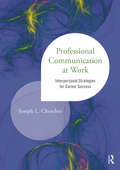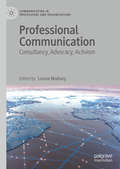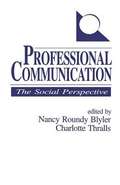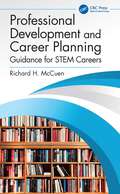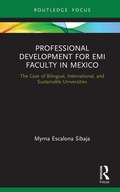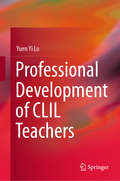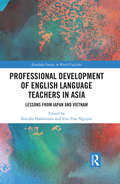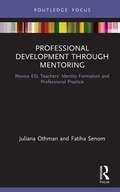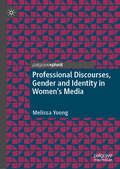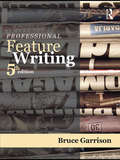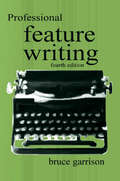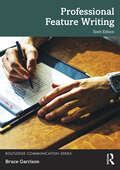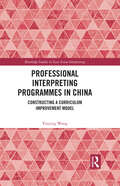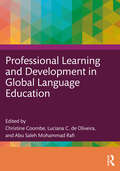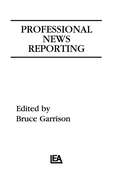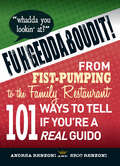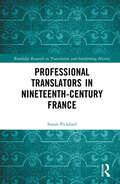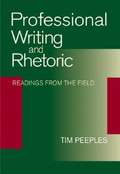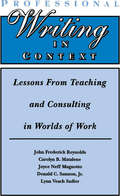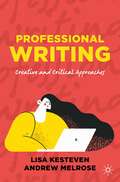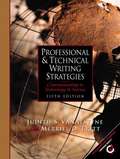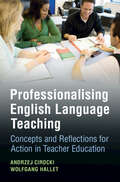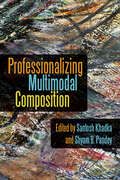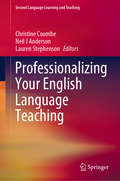- Table View
- List View
Professional Communication at Work: Interpersonal Strategies for Career Success
by Joseph L. ChesebroThis text prepares future professionals for success in the workplace through identifying interpersonal communication skills and strategies and exploring when, how, and why to use them. Informed by academic research, professional literature, and author Joseph L. Chesebro’s own experiences, the text explores and demonstrates the skills that have facilitated Chesebro’s own students to find work and to succeed in their professional lives. Offering a very practical focus on such topics as handling conflict and giving dynamic presentations, Professional Communication at Work also covers essential interpersonal communication skills that are often not discussed, such as: Using networking when job hunting; Earning a good reputation as a new employee Using storytelling and questioning more often Developing coaching relationships with the best senior employees in our workplace, Practicing and developing new skills on our own, and Using workplace politics in a positive and constructive way to accomplish our goals. Utilizing the approach of a supportive communication coach, this text will help readers gain a variety of practical communication strategies they can apply to contribute to success in their own careers.
Professional Communication: Consultancy, Advocacy, Activism (Communicating in Professions and Organizations)
by Louise MullanyThis edited book presents contemporary empirical research investigating the use of language in professional settings, drawing on the contributions of a set of internationally-renowned authors. The book takes a critical approach to understanding professional communication in a range of fields and global contexts. Split into three parts, covering Business and Organisations, Healthcare, and Politics and Institutions, the contributors explore how and why academics engage in workplace research which takes the form of 'consultancy', 'advocacy' and 'activism'. In light of an ever-changing, ever-demanding global landscape, this volume offers new theoretical and methodological ways of conducting professional communication research with real-world impact. It will be of interest to linguistics and communication researchers and practitioners, particularly those working in sociolinguistics, discourse analysis, business communication, health communication, political communication, language and the law and organisational studies.
Professional Communication: The Social Perspective
by Nancy Roundy Blyler Charlotte ThrallsThis volume examines socially-based theory and research, pedagogy and practice in professional communication. The contributors provide a comprehensive overview of the social perspective which emphasizes the context of communication, and then distinguish it from positivistic, cognitive and other competing approaches. After establishing a broad framework for situating developments in professional communication research, the book then moves on to: explore more particular topics, issues and problems within the perspective; examine the historical and theoretical traditions in rhetoric, semiotics, literary criticism, philosophy of science, social psychology and cultural anthropology; discuss implications for classroom practice in professional communications.
Professional Development and Career Planning: Guidance for STEM Careers
by Richard H. McCuenUndergraduate students in almost all disciplines experience curricula dominated by technical foundations, but lacking many of the "soft" topics that the students will need in order to be fully prepared to practice professionally after graduation. Professional Development and Career Planning: Guidance for STEM Careers provides the information that will enable readers to develop a more complete education and ready them for the workplace. It helps readers recognize the importance of topics such as mentoring, developing professional attitudes, communication skills, codes of conduct, ethics, becoming knowledgeable about various aspects of professional life, and more. Each chapter of the book provides the necessary definitions, hypothetical but relevant case studies, methods and practices that can be used to identify relevant professional weaknesses, and ways to overcome each of them. This book serves as an ideal reference for any undergraduate student in the STEM field. Helps readers recognize the importance of topics such as mentoring, developing important professional attitudes, and becoming knowledgeable about aspects of professional life that are not an integral part of the technical component of any curriculum. Identifies the attitudes, abilities, and skills that will be needed to optimally meet professional responsibilities. Provides information about the use of alternative methods of thinking to achieve success in problem-solving, with special emphasis on imaginative-based methods of thinking for multi-dimensional problems.
Professional Development for EMI Faculty in Mexico: The Case of Bilingual, International, and Sustainable Universities (Routledge Focus on English Medium Instruction in Higher Education)
by Myrna Escalona SibajaDespite Mexico’s implementation of a bilingual model in its tertiary education programmes, this book is the first contribution to knowledge regarding EMI in Mexico. The author introduces readers to the Mexican higher education context before providing detailed information regarding the technological and polytechnic subsystem, where EMI has been implemented since 2012. The volume details a pilot and case study conducted in Mexican universities as well as the research findings and conclusions. It closes with recommendations, as well as suggestions for further research. The book explores the implications for the continuous professional development and training for lecturers in the current shift to EMI in Bilingual, International, and Sustainable (BIS) universities. This volume will be of particular interest to researchers in EMI and bilingualism.
Professional Development of CLIL Teachers
by Yuen Yi LoThis book investigates how teacher educators can facilitate the professional development of Content and Language Integrated Learning teachers, and discusses the effectiveness of such efforts and factors affecting it. It proposes theoretical models of professional development for Content and Language Integrated Learning teachers, documents empirical evidence showing the effectiveness of the models, and sheds lights on the various methodological approaches for research in the field.
Professional Development of English Language Teachers in Asia: Lessons from Japan and Vietnam (Routledge Studies in World Englishes)
by Kayoko Hashimoto Van-Trao NguyenWhy has English language proficiency in Japan remained so low in comparison to other Asian countries? Has Vietnam attempted to improve English language teaching because ASEAN has adopted English as its working language? Why do English language teachers struggle with curriculum changes imposed by governments in order to make them competitive in the international community? Do professional development (PD) programs actually meet the needs of teachers? This book addresses issues surrounding these questions by examining how the Japanese and Vietnamese governments have approached and defined the PD of English language teachers and how such PD programs have been delivered. It further analyses the impact of policy changes on individual teachers and explores how PD can help teachers to implement such changes effectively at the micro-level. PD of language teachers or language teacher education is relatively new as a field of inquiry in Applied Linguistics. By including case studies of Japan and Vietnam in the one volume, this book embarks on the challenging task of demonstrating that PD is an essential element of the successful implementation of language policies in Asia, where World Englishes have been shaped by distinct local contexts.
Professional Development through Mentoring: Novice ESL Teachers' Identity Formation and Professional Practice (Routledge Research in Teacher Education)
by Juliana Othman Fatiha SenomIn their book, Othman and Senom provide a unique insight into the challenges faced by novice English as a Second Language (ESL) teachers and establish how mentoring can provide effective support for new teachers’ professional development. The book demonstrates the theoretical background for viewing mentoring as a process crucial to novice teachers’ development, particularly to the teachers’ ability to succeed and grow in a specific workplace environment. Using case studies from a Malaysian context, this book provides a comprehensive understanding of how mentoring can serve as a strategy to facilitate the transition of novice ESL teachers from a teacher education programme to life in real classrooms. Through its case studies, the book will examine both theoretical and practical issues for mentors, teacher educators, policymakers, and administrators when mentoring new ESL teachers. This book will be valuable to researchers who are particularly interested in exploring novice teachers’ identity development, and experienced teachers to help guide new teachers through the socialization process in their schools.
Professional Discourse
by Kenneth KongUsing a wide range of professional genres such as research papers, business reports, performance commentaries, guidebooks and legal documents, this study focuses on the discourse of professional writing, employing analytic paradigms from systemic-functional linguistics, pragmatics, text analysis, sociology and anthropological linguistics. Kenneth Kong argues that while professions use different sets of practices, their use of language displays many universals. This is demonstrated through the analysis of data from a broad cross-section of professional settings such as medicine, law, business, mass media and engineering. This examination of professional discourse, and its important role in society, will be of interest to researchers in applied linguistics, to professionals who want to understand the role of language in their work, and to teachers of English for specific purposes.
Professional Discourses, Gender and Identity in Women's Media
by Melissa YoongThis book examines the professional discourses produced in women’s media in Malaysia and the subject positions that they make available for career women. Drawing on feminist critical discourse analysis, critical stylistics and feminist conversation analysis, it identifies a range of gendered discourses around employment and motherhood that are underpinned by postfeminism and neoliberal feminism. Through close linguistic analysis of magazine and newspaper articles and radio talk, the study reveals that these discourses substitute balance, individual success, self-transformation and positive feelings for structural change, and entrench the very issues hindering gender workplace equality. Chapters discuss topics such as sexism, work-family balance, extensive and intensive mothering, breadwinning, gender stereotypes, beauty work, ‘synthetic sisterhood’, media practices and gender equality policies. This book will be of great interest to students and scholars of language and gender, discourse analysis, and media, communication and cultural studies as well as policy-makers, media practitioners and feminist activists.
Professional Feature Writing
by Bruce GarrisonProfessional Feature Writing provides the basics of news media feature writing and establishes a solid foundation for students and writers making feature writing their career. This fifth edition offers a thorough and up-to-date look at newspaper, magazine, newsletter, and online publications, with emphasis on daily newspapers and consumer magazines. It serves as a comprehensive introduction to feature writing, emphasizing writing skills, article types, and the collegiate and professional writing life. With a wide variety of perspectives and experiences of both young and experienced writers, editors, publishers, and professors, the text is filled with practical guidance for writing a wide variety of features. Emphasizing writing values to strengthen a new writer's journalistic practices, author Bruce Garrison offers insights and expertise based on his own experience and the advice of professionals. He also includes lists of tips, observations, guidelines, sources, and story ideas, and gives a solid tour of the forms and approaches to feature writing. New for this edition are: Updated examples of feature writing, integrated throughout the text Profiles of young newspaper and magazine feature writers, highlighting their experiences and paths to success in the profession Coverage of computer-based research tools for writers, including discussion of on-line computer-based research tools with specific focus on the World Wide Web Discussion of online newspapers, magazines, newsletters, and original online publications and the role of feature writing for electronic publications. Each chapter includes excerpts and complete articles from the nation's leading publications. Building on introductory writing and reporting skills, this text is appropriate for upper-division journalism students learning feature writing and advanced writing topics. It will also serve as a valuable resource for freelance writers.
Professional Feature Writing
by Bruce GarrisonThis text offers the basics of news media feature writing and guides motivated beginners down the right path toward success as professional feature writers. This fourth edition gives advanced writers and reporters a thorough look at newspaper, magazine, newsletter, and online publications, with emphasis on daily newspapers and consumer magazines. Three primary aspects of feature writing are emphasized: introduction and writing skills/basics, article types, and the collegiate and professional writing life. Each chapter includes excerpts and complete articles from some of the nation's leading publications that illustrate points made in the text. Professional Feature Writing provides a wide variety of perspectives and experiences of both young and experienced writers, editors, publishers, and professors. Emphasizing writing values that will strengthen a new writer's journalistic practices, readers will gain insights and expertise from the narrative, the advice of professionals, and current writing examples. The book offers lists of tips, observations, in-depth looks at both young and veteran writers, guidelines, sources, and story ideas. As such, this volume is a solid tour of the forms and approaches to feature writing. Building on introductory writing and reporting skills, this text is written for advanced students, and is filled with practical advice for writing a wide variety of features.
Professional Feature Writing (Routledge Communication Series)
by Bruce GarrisonProfessional Feature Writing provides an essential introduction to the basics of news media feature writing and establishes a solid foundation for students and writers making feature writing their careers. This sixth edition offers a thorough and up-to-date look at newspapers, magazines, newsletters, and online publications, with emphasis on daily newspapers, consumer magazines, and online news. Special attention is paid to writing skills, feature story types, and the collegiate and professional writing life, and the text is filled with practical guidance for writing a wide variety of features, drawing on insights from both junior and experienced writers, editors, and publishers. Alongside a solid tour of forms and approaches to feature writing, the author includes lists of tips, observations, guidelines, sources, and story ideas. New to this edition are: Three chapters covering interviewing and observation in features, social media in feature writing, and writing social trends features; Updated international examples of feature writing, integrated throughout the text; Additional and expanded discussion about writing features for online publications and the uses of social media in gathering information and reporting; Increased attention to multimedia and the impact of new technologies on the industry. Building on introductory writing and reporting skills, this text is appropriate for upper-division journalism students learning feature writing and advanced writing topics. It will also serve as a valuable resource for freelance writers.
Professional Interpreting Programmes in China: Constructing a Curriculum Improvement Model (Routledge Studies in East Asian Interpreting)
by Yinying WangWang presents the status quo of curriculum development in professional interpreting programmes in China and points to the urgency to devise a curriculum improvement model to ensure the relevance of such programmes against a changing reality. She covers the European experience in interpreter education that China can learn from and discusses opportunities arising from previous examples for China to iterate upon in the context of the broader and more diverse professional reality. The book puts the nature of professional interpreters and, in turn, interpreting programmes, under the concurring lens of curriculum studies and the sociology of professions. Wang identifies eight stakeholders which call for changes in interpreting programmes, and six categories of competence (or sub-competence) which see a progression from undergraduate to graduate and lifelong-learning stage. These serve as curriculum goals and encapsulate the recommended changes in institutional curricula. The conceptualised model is then described with a case study on Chinese-English retour training to show its applicability and relevance in interpreting programmes on the ground. Offering insight for academics, practitioners and trainee interpreting students and of relevance to a broader interpreting community looking to set up or reform interpreting curricula, Wang’s book will help ensure curriculum improvement that is theoretically sound and practically viable.
Professional Learning and Development in Global Language Education
by Luciana C. Oliveira Christine Coombe Abu Saleh Mohammad RafiThis edited collection focuses on general principles and practices of professional learning and development in both pre-service and in-service teacher contexts for language education around the world.The field of teaching is a constantly evolving profession, and one of the most important aspects of teaching is learning. Research shows that the more professional learning and development that teachers engage in, the more likely their students are to succeed and the more likely they are to be effective and fulfilled in their careers. This edited collection seeks to stress the continued importance of teacher engagement in professional learning and development for language educators through a variety of different essential elements, among them pre-service teacher education, in-service teacher education, utilizing professional associations, as well as technology-enhanced activities. The book showcases the diversity of teacher learning and development activities and practices used in unique and atypical language education contexts around the world. The contributions in this collection exhibit work done on the African continent and in countries such as Brazil, Canada, Japan, Nepal, Saudi Arabia, the United Arab Emirates, the United States, and the United Kingdom.The book will be especially useful for students and pre-service teachers in TESOL, language teaching, and bilingual education, as well as in-service teachers of multilingual learners.
Professional News Reporting (Routledge Communication Series)
by Bruce GarrisonBecause reporting is changing, this volume offers readers a thorough introduction to the rapidly evolving world of gathering information for local news organizations. This easy-to-read text is filled with contemporary examples and solid advice for the beginning reporting student. Designed for students with a foundation in news writing, it provides chapters on such basics as news research, interviewing, and observation skills. It further offers a chapter on the use of personal computers as research and reporting tools. Readers will find useful tips and examples written by award-winning professional journalists that reflect the numerous changes in the art and science of information gathering in the past decade.
Professional Services for Writers: Comprehensive contact information for freelance editors, proofreaders, self publ ishers, and other service providers used by writers
by UnknownFrom the editors at Writer's Digest, this fantastic resource for romance writers details hundreds of magazine and book publishers who are interested in acquiring and publishing new romantic fiction. Each market listing provides information on where the publisher is located, what they're looking for, who to contact, how to reach them, and what their terms are. Each entry also comes with special insider tips for getting their attention. You want to get your romance published? Start by looking here.
Professional Translators in Nineteenth-Century France (Routledge Research on Translation and Interpreting History)
by Susan PickfordThis book shines a light on the practices and professional identities of translators in nineteenth-century France, speaking to the translatorial turn in translation studies which spotlights translators as active agents in the international circulation of texts.The volume charts the sociocultural, legal, and economic developments which paved the way for the development of the professional translation industry in France in the period following the French Revolution through to the First World War. Drawing on archival material from French publishers, institutional archives, and translators’ own discourses, and applying historiographical methodologies, Pickford explores the working conditions of professional translators during this time and the subsequent professional identities which emerged from the collective practice of translation across publishing, business, and government. In its diachronic approach to translators’ practices and identities, the book aims to recover the collective contributions of these translators and, in turn, paves the way for a new approach to “translator history from below”.The volume will appeal to students and scholars in translation studies, particularly those with an interest in literary translation, translation history, and translator practices.
Professional Writing and Rhetoric: Readings from the Field
by Tim PeeplesProfessional Writing and Rhetoric is a disciplinary reader that introduces students to professional writing by inviting them into conversations about the field by people in the field. Intended for undergraduates and entry-level masters students who are majoring, minoring, or getting certificates in professional writing studies, Professional Writing and Rhetoric is an edited reader that makes the field's theoretical discussions accessible to these students. Addressing a growing need as the field expands "up" from service-oriented courses and "down" from advanced graduate programs, it fills an important gap in the books currently available within professional writing studies. This text guides students into the discussions that continue to form this relatively young field by (1) organizing readings rhetorically, (2) including several readings that are regularly cited in the field's literatures, (3) selecting readings that are accessible to students, and (4) offering pedagogical devices that aid comprehension and encourage critical reflection. The aim is not to present a "greatest hits of the field," nor to direct students' thinking and practice toward the hottest new theories, nor to challenge the thinking of those already comfortably in the field. Instead, older and newer selections are intermixed within a rhetorical framework to encourage students to make connections across readings, promote reflective rhetorical practice, stimulate discussion, and encourage students to become co-inquirers within the discipline.
Professional Writing in Context: Lessons From Teaching and Consulting in Worlds of Work
by Carolyn B. Matalene John Frederick Reynolds Joyce Neff Magnotto Donald C. Samson Jr. Lynn Veach SadlerThis volume explores adult work-world writing issues from the perspectives of five seasoned professionals who have logged hundreds of hours working with adults on complicated written communication problems. It examines the gap between school-world instructional practices and real-world problems and situations. After describing the five major economic sectors which are writing intensive, the text suggests curricular reforms which might better prepare college-educated writers for these worlds. Because the volume is based on the extensive work-world experiences of the authors, it offers numerous examples of real-world writing problems and strategies which illustrate concretely what goes wrong and what needs to be done about it.
Professional Writing: Creative and Critical Approaches
by Andrew Melrose Lisa KestevenThis book has been designed specifically for students in writing classes and other writers interested in developing proficient writing careers in a professional environment. As professional writing continues to change rapidly alongside digital developments, this book frames professional writing particularly for 'creative' and other writers. The professional world needs writers with a diverse portfolio of skills and capabilities; if writers can master these, they are more able to make a living from their writing and support their more creative endeavours. Each chapter includes a comprehensive range of exercises to build professional skills, along with learning objectives, case studies, worked examples, tips for success, and suggested websites and further reading.
Professional and Technical Writing Strategies: Communicating in Technology and Science (Fifth Edition)
by Merrill D. Tritt Judith S. VanalstyneThis book is designed to be used as a textbook by college and university students. However, its scope is, by design, much broader than that. It has applications for those writing in the fields of science, technology, business. It can be used by businesses to strengthen the writing abilities of those writing manuals. An excellent book with a wide range of applications. Good examples and practice exercises.
Professionalising English Language Teaching: Concepts and Reflections for Action in Teacher Education
by Andrzej Cirocki Wolfgang HalletThe issue of professionalisation of English Language Teaching (ELT) remains underexplored in academic discourse. Written by experienced teacher educators, this book presents a timely guide to professional teacher development in ELT, showing how teacher educators and classroom practitioners can develop their practice. It scrutinises key topic areas for teacher education, detailing the specific competences that professional teachers need to demonstrate in the 21st century, including transforming English language classrooms, engaging in ongoing debates that examine theory, research and practice, responding to managerial and policy discourses on English language instruction, and playing a leading role in regulating the entire teaching profession. It highlights how meaningful, impactful, transformative, and sustainable language education requires high-quality teachers who are lifelong learners, classroom ethnographers, and educational leaders. It is essential reading for pre- and in-service teachers, teacher educators and professional development providers, educational researchers, as well as policy makers in the field of ELT.
Professionalizing Multimodal Composition
by Santosh Khadka Shyam PandeyMultimodal composition is becoming increasingly popular in university classrooms as faculty, students, and institutions come to recognize that old and new technologies have enabled, and even demanded, the use of more than one composing mode for communicating, solving problems, and keeping up with the latest discourse. Professionalizing Multimodal Composition embraces and enacts multimodal composition in various writing courses and programs by exploring institutional, programmatic, and individual faculty initiatives for capacity building and human resource development across institutions. Academic leaders, scholars, and faculty who have successfully designed and launched academic programs or faculty development initiatives discuss the theoretical and logistical questions considered in their design, the outcomes they achieved, and how others can emulate them. This exchange of knowledge, insight, experiences, and lessons learned among community members is critical for enabling or inspiring other programs, departments, and institutions to conceive, design, and launch academic programs or faculty development initiatives for their own faculty. The larger goal of professionalizing is to work with teaching faculty to increase their interactional expertise with multimodal composition, and this collection offers a set of models for how faculty can do that at their own institutions and in their own programs.
Professionalizing Your English Language Teaching (Second Language Learning and Teaching)
by Christine Coombe Neil J Anderson Lauren StephensonWritten by leading experts in the field of TESOL, this book explores the literature on various topic areas and demonstrates how teachers can increase their levels of professionalism by acquiring some general and field-specific strategies. Being a teaching professional is not simply about having the right teaching qualifications and good academic standing, it involves a commitment to being innovative and transformative in the classroom and helping both students and colleagues achieve their goals. A dictionary definition of professionalism reads as follows: professionalism is the conduct, aims, or qualities that characterize or mark a profession or a professional person; and it defines a profession as a calling requiring specialized knowledge and often long and intensive academic preparation (Merriam-Webster, 2013). However, according to Bowman (2013), professionalism is less a matter of what professionals actually do and more a matter of who they are as human beings. Both of these views imply that professionalism encompasses a number of different attributes, and, together, these attributes identify and define a professional. The book is primarily intended for teachers at all levels and in all contexts who are interested in improving their professionalism and developing strategies that can take them to higher levels in the field of TESOL/ELT.
